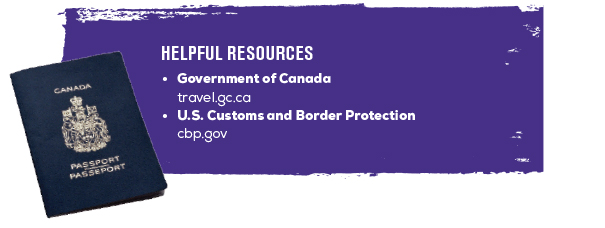For young athletes, travel to an international competition is a mind-blowing chance of a lifetime. Behind the scenes though, it’s not all glamour and glory. For coaches, team managers and parents, taking an exuberant group of under-age athletes out of the country involves loads of planning and a million small details.
Get your papers in order
The border is the wrong place to discover that your players need special visas. Before travelling, check host country requirements around minors, passports, supporting documentation, visas, vaccinations, etc.

Obtain passports and visas well beforehand, says Todd Jackson, senior manager, safety and insurance, at Hockey Canada.
If parents aren’t going along, get “a notarized letter from the parents providing permission for the child to travel with the group,” says Jackson, and check whether the host country or your sport governing body has further required procedures and forms.
Jackson recommends holding a meeting with parents to discuss trip details and prerequisites.
Bring in extra help
Hire a team manager to handle “logistics, arrangements, bookings, any little odd things and to troubleshoot,” says Jean-François Roy, talent development coordinator with Athletics Canada. This frees up coaches to coach, and athletes to compete.
Chaperones are a big help with supervision, but must be well prepped. They must also be properly screened as per a sport governing body’s requirements, says Jackson.
Health and safety measures
Gather athletes’ health information. “Many sport governing bodies have health history forms that already exist, so it’s just a case of making sure those are up to date,” says Jackson.
Besides provincial health insurance, and the policies that sports organizations usually carry, parents are advised to purchase additional travel insurance for their child. “It specifically should cover players for sport-type injuries,” says Jackson.
Know the location of hospitals near your destination and how to contact emergency services.
When travelling, says Roy, the team manager should “always carry a binder with everything: all the bookings, the reservations you’ve made, plane tickets for everyone, the emergency contact information.” Store copies of important information separately, just in case.
Have players carry an emergency card, says Jackson, “so they know how to get in touch with team representatives.”
Manage all that youthful energy
When it’s time to take in the sights, young athletes must go in groups, wear their accreditation badges as ID and “inform us of where they’re going and their expected time of return,” Roy says.
Roy also insists on what’s sure to be the least popular measure of all: curfews for under-age athletes.





